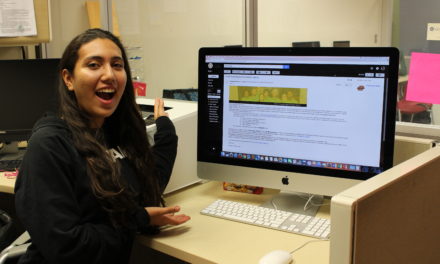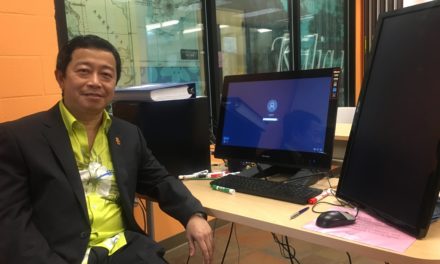BY KAYLA VALERA | STAFF WRITER
Since the age of 4, Camila Nutt, who was named Ryan, knew that despite her biological gender being male, she identified as a female.
Growing up, she endured bullying, disparaging comments and judgment from fellow students and teachers and from a sibling at home. She still lives with her mother who is extremely supportive of her. And although her father eventually accepted her for the way she was before he passed away in 2011, he believed that his child’s demeanor was only a phase that she would grow out of. Being a masculine man himself, he didn’t understand why his child would stray from the conventions of being a boy.
Before she even came out as a transgender, Nutt had to confront bullies throughout every stage of her life. These battles that she faced never deterred her from being her true self and has even shaped her to be the strong individual that refuses to be a victim.
“I’ve been fighting all my life,” says Nutt, a 22-year-old who is in her fourth-year at U.H. Mānoa studying intercultural constituency relations.
Growing up in Waimea on the island of Hawaiʻi, Nutt recalls that “there was no peace” when it came to some of the transphobic people that she grew up around. In school, the bullying was only worsened when students picked on her high-pitched voice.
“The place that I grew up was really conservative,” Nutt said. “You either know your place and how to behave or you get whacked.”
After moving to Niu Valley, Oʻahu, in 2008, Nutt remembers that the adversity continued up until her high school years at Kalani High School. At the time she suspected that she must be gay, since she was only attracted to men. However, Kaleo Gagne, who was a hairdresser at her salon and is gay himself, enlightened Nutt on the distinction between being gay versus identifying as a transgender.
“He cleared it up for me and told me, ‘You’re actually transgender if you’ve been feeling [uncomfortable] since you were small,’” Nutt said. “He said that I should never confuse [being transgender] with just being gay because that’s what people want [LGBTQ people] to do. But there’s a clear difference.”
Embracing this new knowledge, Nutt manifested her femininity through the makeup and accessories that she wore at school. Even though doing so allowed her to express herself, it also spurred mistreatment from her classmates as well as her teachers.
Upon asking a teacher for tutoring help, Nutt remembers that the teacher told her that she “doesn’t help people like her.” Nutt didn’t stand for it and threw a desk at her teacher. She felt as though she was a “big target” to everybody – teachers and students alike.
The high school administration didn’t help much either. Instead of addressing the cause of the issue, they would simply bring undue attention to Nutt by threatening her tormentors to stop otherwise they’d call the cops. While Nutt wanted the harassment to stop altogether, she would have rather stood her ground to these high school bullies so that they knew they couldn’t intimidate her.
Once Nutt made the transition from high school to college at KCC in 2013, things started to fall into place. Using part of her graduation money, she bought a whole new wardrobe for herself consisting of women’s clothing and even went by the name Camila.
This came about when a professor took attendance and called her by her birth name. When she later explained to her teacher how she would rather be addressed as a woman, the teacher then asked what she’d like to be called. Not having given much thought to a female name for herself, she supplied the name Camila, since her aunty’s name on her dad’s side was Kami, and her friend was also named Camille, which she thought sounded pretty. So she created Camila, her own spin on those two names.
Despite the name Camila coming organically to her, she doesn’t feel completely bound to that name. With something as drastic as legally changing her name, Nutt believes that she would rather wait for a name that comes to her that is more meaningful. Because of this, her legal name is still Ryan. In the meantime Nutt will settle for politely correcting others.
While college gave her a platform to show her true self, prejudice started to rear itself into her college life at vulnerable moments, like using the bathroom.
“Guys would walk in [the bathroom], walk right out, check if they’re in the right bathroom, then come back in and shake their head at me,” Nutt said. “Or, they would do the sexual route because they think I’m in there to do business, like that stigma of all trannies being prostitutes. [They’d] give me a nod, agreeing to something that I didn’t even offer. … I was sexually harassed so many times on campus.”
It was only after a year into college when Nutt’s KCC psychology professor, Philippe Gross, explained that it’s OK to use the women’s bathroom at this school as a transwoman.
“It is critical to ensure that transgender individuals are able to function in every aspects of life in ways that are consistent with their gender identity,” Gross wrote in an email. “I cannot think of any valid reasons to deprive [Camila] of her dignity by forcing her to use a restroom that is not consistent with how she feels.”
Though most girls gave her “stink eye” for being in the women’s bathroom, Nutt was relieved to know she was entitled to use the bathroom that she preferred. Her friends would also support her at these times and even suggested that they’d wait outside of the bathroom if anyone gave her trouble.
Nutt is even more concerned with President Donald Trump’s decisions that have further ostracized the LGBTQ community. His decision to roll back the federal government’s protections of transgender students has increased tension between transphobic people and the LGBTQ community. Nutt said she can imagine a scenario where girls in the women’s bathroom might gang up against her and force her out due to her being a transwoman. However, she isn’t scared of such an encounter and said she is willing to stand her ground.
Despite these fears, Nutt has noticed that when she returns to her hometown of Waimea, the people she grew up around have been more accepting of her as of late, understanding that she is the same person on the inside before she identified as a transwoman.
Ever since she was in high school, Nutt has been wanting to get a gender reassignment surgery but hasn’t had the means to cover for the nearly $20,000 procedure. Until then she plans on working hard in school to receive her master’s degree and finding a job. Recently, she has started taking hormone injections and testosterone blocking pills as a first step for her transition.
Nutt feels that her progress truly lies in her own perception of her self-worth, because at the end of the day, it’s important that you love yourself.
“I feel proud of myself,” she said. “At the beginning of my transition, I was in a bad mental state and would hook up with guys to verify how beautiful I was. Now I know I’m beautiful and I’m glad that I grew out of that phase.”






